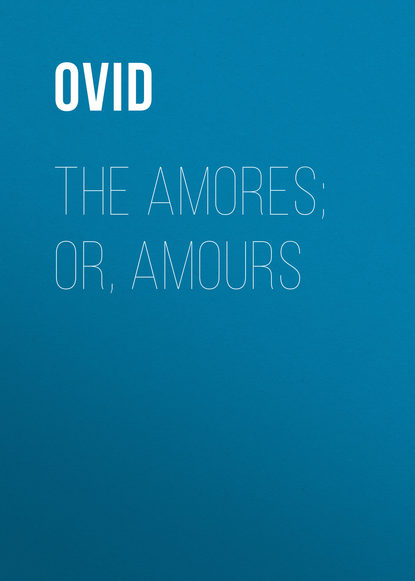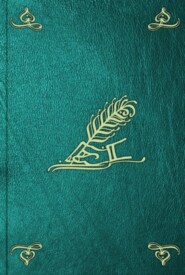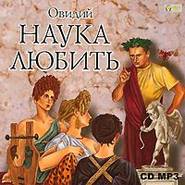По всем вопросам обращайтесь на: info@litportal.ru
(©) 2003-2024.
✖
The Amores; or, Amours
Настройки чтения
Размер шрифта
Высота строк
Поля
646 (return (#x6_x_6_i13))
[ I will hate.—Ver. 35. This and the next line are considered by Heinsius and other Commentators to be spurious.]
647 (return (#x6_x_6_i19))
[ She who but lately.—Ver. 5. Commentators are at a loss to know whether he is here referring to Corinna, or to his other mistress, to whom he alludes in the Tenth Elegy of the Second Book, when he confesses that he is in love with two mistresses. If Corinna was anything more than an ideal personage, it is probable that she is not meant here, as he made it a point not to discover to the world who was meant under that name; whereas, the mistress here mentioned has been recommended to the notice of the Roman youths by his poems.]
648 (return (#x6_x_6_i20))
[ Made proclamation.—Ver. 9. He says that, unconsciously, he has been doing the duties of the 'præco' or 'crier,' in recommending his mistress to the public. The 'præco,' among the Romans, was employed in sales by auction, to advertise the time, place, and conditions of sale, and very probably to recommend and praise the property offered for sale. These officers also did the duty of the auctioneer, so far as calling out the biddings, but the property was knocked down by the 'magister auctionum.' The 'præcones' were also employed to keep silence in the public assemblies, to pronounce the votes of the centuries, to summon the plaintiff and defendant upon trials, to proclaim the victors in the public games, to invite the people to attend public funerals, to recite the laws that were enacted, and, when goods were lost, to cry them and search for them. The office of a 'præco' was, in the time of Cicero, looked upon as rather disreputable.]
649 (return (#x6_x_6_i20))
[ Thebes.—Ver. 15. He speaks of the Theban war, the Trojan war, and the exploits of Caesar, as being good subjects for Epic poetry; but he says that he had neglected them, and had wasted his time in singing in praise of Corinna. This, however, may be said in reproof of his general habits of indolence, and not as necessarily implying that Corinna is the cause of his present complaint. The Roman poet Statius afterwards chose the Theban war as his subject.]
650 (return (#x6_x_6_i20))
[ Poets as witnesses.—Ver. 19. That is, 'to rely implicitly on the testimony of poets.' The word 'poetas' requires a semicolon after it, and not a comma.]
651 (return (#x6_x_6_i21))
[ The raging dogs.—Ver. 21. He here falls into his usual mistake of confounding Scylla, the daughter of Nisus, with Scylla, the Nymph, the rival of Circe, in the affections of Glaucus. See the Note to 1. 33 of the First Epistle of Sabinus, and the Eighth and Fourteenth Books of the Metamorphoses.]
652 (return (#x6_x_6_i21))
[ Descendant of Abas.—Ver. 24. In the Fourth Book of the Metamorphoses he relates the rescue of Andromeda from the sea monster, by Perseus, the descendant of Abas, and clearly implies that he used the services of the winged horse Pegasus on that occasion. It has been suggested by some Commentators, that he here refers to Bellerophon; but that hero was not a descendant of Abas, and, singularly enough, he is not on any occasion mentioned or referred to by Ovid.]
653 (return (#x6_x_6_i21))
[ Extended Tityus.—Ver. 25. Tityus was a giant, the son of Jupiter and Elara. Offering violence to Latona, he was pierced by the darts of Apollo and hurled to the Infernal Regions, where his liver was doomed to feed a vulture, without being consumed.]
654 (return (#x6_x_6_i21))
[ Enceladus.—Ver. 27. He was the son of Titan and Terra, and joining in the war against the Gods, he was struck by lightning, and thrown beneath Mount Ætna. See the Pontic Epistles, Book ii. Ep.ii. 1.11.]
655 (return (#x6_x_6_i21))
[ The-two-shaped damsels.—Ver. 28. He evidently alludes to the Sirens, with their two shapes, and not to Circe, as some have imagined.]
656 (return (#x6_x_6_i21))
[ The Ithacan bags.—Ver. 29. Æolus gave Ulysses favourable wind* sewn up in a leather bag, to aid him in his return to Ithaca. See tha Metamorphoses, Book xiv. 1. 223]
657 (return (#x6_x_6_i21))
[ The Cecropian bird.—Ver. 32. He calls Philomela the daughter of Pandion, king of Athens, 'Cecropis ales Cc crops having been the first king of Athens. Her story is told in the Sixth Book of the Metamorphoses.]
658 (return (#x6_x_6_i21))
[ A bird, or into gold.—Ver. 33. He alludes to the transformation of Jupiter into a swan, a shower of gold, and a bull; in the cases of Leda, Danaë, and Europa.]
659 (return (#x6_x_6_i21))
[ The Theban seed.—Ver. 35. He alludes to the dragon's teeth sown by Cadmus. See the Third Book of the Metamorphoses.]
660 (return (#x6_x_6_i21))
[ Distil amber tears.—Ver. 37. Reference is made to the transformation of the sisters of Phaeton into poplars that distilled amber. See the Second Book of the Metamorphoses, 1. 364.]
661 (return (#x6_x_6_i21))
[ Who once were ships.—Ver. 38. He alludes to the ships of Æneas, which, when set on fire by Turnus, were changed into sea Nymphs.]
662 (return (#x6_x_6_i21))
[ The hellish banquet.—Ver. 39. Reference is made to the revenge of Atreus, who killed the children of Thyestes, and set them on table before their father, on which occasion the Sun is said to have hidden his face.]
663 (return (#x6_x_6_i21))
[ Stonesfollowed the lyre.—Ver. 40. Amphion is said to have raised the walls of Thebes by the sound of his lyre.]
664 (return (#x6_x_6_i26))
[ Camillus, by thee.—Ver. 2. Marcus Furius Camillus, the Roman general, took the city of Falisci.]
665 (return (#x6_x_6_i27))
[ The covered paths.—Ver. 12. The pipers, or flute players, led the procession, while the ground was covered with carpets or tapestry.]
666 (return (#x6_x_6_i27))
[ Snow-white heifers.—Ver. 14. Pliny the Elder, in his Second Book, says, 'The river Clitumnus, in the state of Falisci, makes those cattle white that drink of its waters.']
667 (return (#x6_x_6_i27))
[ In the lofty woods.—Ver. 20. It is not known to what occasion this refers. Juno is stated to have concealed herself on two occasions; once before her marriage, when she fled from the pursuit of Jupiter, who assumed the form of a cuckoo, that he might deceive her; and again, when, through fear of the giants, the Gods took refuge in Egypt and Libya. Perhaps the former occasion is here referred to.]
668 (return (#x6_x_6_i27))
[ As a mark.—Ver. 21. This is similar to the alleged origin of the custom of throwing sticks at cocks on Shrove Tuesday. The Saxons being about to rise in rebellion against their Norman oppressors, the conspiracy is said to have been discovered through the inopportune crowing of a cock, in revenge for which the whole race of chanticleers were for centuries submitted to this cruel punishment.]
669 (return (#x6_x_6_i27))
[ With garments.—Ver. 24. As 'vestis' was a general name for a covering of any kind, it may refer to the carpets which appear to be mentioned in the twelfth line, or it may mean, that the youths and damsels threw their own garments in the path of the procession.]
670 (return (#x6_x_6_i27))
[ After the Grecian manner.—Ver. 27. Falisci was said to have been a Grecian colony.]
[ I will hate.—Ver. 35. This and the next line are considered by Heinsius and other Commentators to be spurious.]
647 (return (#x6_x_6_i19))
[ She who but lately.—Ver. 5. Commentators are at a loss to know whether he is here referring to Corinna, or to his other mistress, to whom he alludes in the Tenth Elegy of the Second Book, when he confesses that he is in love with two mistresses. If Corinna was anything more than an ideal personage, it is probable that she is not meant here, as he made it a point not to discover to the world who was meant under that name; whereas, the mistress here mentioned has been recommended to the notice of the Roman youths by his poems.]
648 (return (#x6_x_6_i20))
[ Made proclamation.—Ver. 9. He says that, unconsciously, he has been doing the duties of the 'præco' or 'crier,' in recommending his mistress to the public. The 'præco,' among the Romans, was employed in sales by auction, to advertise the time, place, and conditions of sale, and very probably to recommend and praise the property offered for sale. These officers also did the duty of the auctioneer, so far as calling out the biddings, but the property was knocked down by the 'magister auctionum.' The 'præcones' were also employed to keep silence in the public assemblies, to pronounce the votes of the centuries, to summon the plaintiff and defendant upon trials, to proclaim the victors in the public games, to invite the people to attend public funerals, to recite the laws that were enacted, and, when goods were lost, to cry them and search for them. The office of a 'præco' was, in the time of Cicero, looked upon as rather disreputable.]
649 (return (#x6_x_6_i20))
[ Thebes.—Ver. 15. He speaks of the Theban war, the Trojan war, and the exploits of Caesar, as being good subjects for Epic poetry; but he says that he had neglected them, and had wasted his time in singing in praise of Corinna. This, however, may be said in reproof of his general habits of indolence, and not as necessarily implying that Corinna is the cause of his present complaint. The Roman poet Statius afterwards chose the Theban war as his subject.]
650 (return (#x6_x_6_i20))
[ Poets as witnesses.—Ver. 19. That is, 'to rely implicitly on the testimony of poets.' The word 'poetas' requires a semicolon after it, and not a comma.]
651 (return (#x6_x_6_i21))
[ The raging dogs.—Ver. 21. He here falls into his usual mistake of confounding Scylla, the daughter of Nisus, with Scylla, the Nymph, the rival of Circe, in the affections of Glaucus. See the Note to 1. 33 of the First Epistle of Sabinus, and the Eighth and Fourteenth Books of the Metamorphoses.]
652 (return (#x6_x_6_i21))
[ Descendant of Abas.—Ver. 24. In the Fourth Book of the Metamorphoses he relates the rescue of Andromeda from the sea monster, by Perseus, the descendant of Abas, and clearly implies that he used the services of the winged horse Pegasus on that occasion. It has been suggested by some Commentators, that he here refers to Bellerophon; but that hero was not a descendant of Abas, and, singularly enough, he is not on any occasion mentioned or referred to by Ovid.]
653 (return (#x6_x_6_i21))
[ Extended Tityus.—Ver. 25. Tityus was a giant, the son of Jupiter and Elara. Offering violence to Latona, he was pierced by the darts of Apollo and hurled to the Infernal Regions, where his liver was doomed to feed a vulture, without being consumed.]
654 (return (#x6_x_6_i21))
[ Enceladus.—Ver. 27. He was the son of Titan and Terra, and joining in the war against the Gods, he was struck by lightning, and thrown beneath Mount Ætna. See the Pontic Epistles, Book ii. Ep.ii. 1.11.]
655 (return (#x6_x_6_i21))
[ The-two-shaped damsels.—Ver. 28. He evidently alludes to the Sirens, with their two shapes, and not to Circe, as some have imagined.]
656 (return (#x6_x_6_i21))
[ The Ithacan bags.—Ver. 29. Æolus gave Ulysses favourable wind* sewn up in a leather bag, to aid him in his return to Ithaca. See tha Metamorphoses, Book xiv. 1. 223]
657 (return (#x6_x_6_i21))
[ The Cecropian bird.—Ver. 32. He calls Philomela the daughter of Pandion, king of Athens, 'Cecropis ales Cc crops having been the first king of Athens. Her story is told in the Sixth Book of the Metamorphoses.]
658 (return (#x6_x_6_i21))
[ A bird, or into gold.—Ver. 33. He alludes to the transformation of Jupiter into a swan, a shower of gold, and a bull; in the cases of Leda, Danaë, and Europa.]
659 (return (#x6_x_6_i21))
[ The Theban seed.—Ver. 35. He alludes to the dragon's teeth sown by Cadmus. See the Third Book of the Metamorphoses.]
660 (return (#x6_x_6_i21))
[ Distil amber tears.—Ver. 37. Reference is made to the transformation of the sisters of Phaeton into poplars that distilled amber. See the Second Book of the Metamorphoses, 1. 364.]
661 (return (#x6_x_6_i21))
[ Who once were ships.—Ver. 38. He alludes to the ships of Æneas, which, when set on fire by Turnus, were changed into sea Nymphs.]
662 (return (#x6_x_6_i21))
[ The hellish banquet.—Ver. 39. Reference is made to the revenge of Atreus, who killed the children of Thyestes, and set them on table before their father, on which occasion the Sun is said to have hidden his face.]
663 (return (#x6_x_6_i21))
[ Stonesfollowed the lyre.—Ver. 40. Amphion is said to have raised the walls of Thebes by the sound of his lyre.]
664 (return (#x6_x_6_i26))
[ Camillus, by thee.—Ver. 2. Marcus Furius Camillus, the Roman general, took the city of Falisci.]
665 (return (#x6_x_6_i27))
[ The covered paths.—Ver. 12. The pipers, or flute players, led the procession, while the ground was covered with carpets or tapestry.]
666 (return (#x6_x_6_i27))
[ Snow-white heifers.—Ver. 14. Pliny the Elder, in his Second Book, says, 'The river Clitumnus, in the state of Falisci, makes those cattle white that drink of its waters.']
667 (return (#x6_x_6_i27))
[ In the lofty woods.—Ver. 20. It is not known to what occasion this refers. Juno is stated to have concealed herself on two occasions; once before her marriage, when she fled from the pursuit of Jupiter, who assumed the form of a cuckoo, that he might deceive her; and again, when, through fear of the giants, the Gods took refuge in Egypt and Libya. Perhaps the former occasion is here referred to.]
668 (return (#x6_x_6_i27))
[ As a mark.—Ver. 21. This is similar to the alleged origin of the custom of throwing sticks at cocks on Shrove Tuesday. The Saxons being about to rise in rebellion against their Norman oppressors, the conspiracy is said to have been discovered through the inopportune crowing of a cock, in revenge for which the whole race of chanticleers were for centuries submitted to this cruel punishment.]
669 (return (#x6_x_6_i27))
[ With garments.—Ver. 24. As 'vestis' was a general name for a covering of any kind, it may refer to the carpets which appear to be mentioned in the twelfth line, or it may mean, that the youths and damsels threw their own garments in the path of the procession.]
670 (return (#x6_x_6_i27))
[ After the Grecian manner.—Ver. 27. Falisci was said to have been a Grecian colony.]














